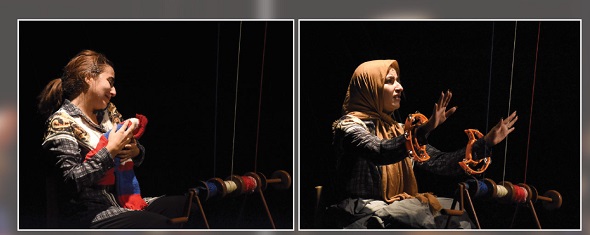Damascus (ST)_ On Kabbani Theater stage colorful strings hanging from wool balls were awaiting us, a mother weaving a three color wool sweater on a loom for her son Shadi. Those colorful strings were weaved with tears of oppression and loss. The heroine was groaning from deprivation, cruelty and denial of a society that put her in a large prison.
Kabbani Theater hosted three consecutive shows of “Hiya & Honna” [She& She(s)] play, which is a Lebanese monodrama posing the problem of womanhood in the Arab world; performed by the Lebanese actress Marwa Qarouni and directed and script written by Mashhour Mustafa.
In Today’s show “She” talked about “She(s)” in the plural form, the stories of many abused and battered women, suffering from a patriarchal society. The play tells the stories of women who are neither divorced nor still married. Those who swing between society’s inferior look to a divorced woman or their obligated submission to the will of a partner who is constantly exercising physical, moral and psychological violence upon them.
The play’s protagonist _performed by the Lebanese actress Marwa Qarouni_ is a woman who tells her story and the story of women with a capital (W); who are fighting to get their most basic rights; because of arbitrary laws depriving them of their right of custody for their children and martial expenditure especially for nonworking women.
 “We worked a lot on the external gestures and motion of the character, and how she moves from laughter to tears. This matter required a lot of research and investigation of real women’s stories and tragedies, to be able to display their actual stories and perform their genuine emotions in front of the audience.” explained Marwa Qarouni.
“We worked a lot on the external gestures and motion of the character, and how she moves from laughter to tears. This matter required a lot of research and investigation of real women’s stories and tragedies, to be able to display their actual stories and perform their genuine emotions in front of the audience.” explained Marwa Qarouni.
“We raised as well the problem of family breakdown and its impact on children when they reach maturity. How they have been witnesses of their mother abuse and brutal treatment.” added Qarouni.
As for her feelings, Qaraouni said: “Although the audience reacted and laughed, it was black humor.”
The play posed the issue of honor, and crimes of honor committed against women by their fathers, husbands or brothers to wash the shame of the family because of the “bad reputation” of those women.
The director and author of [She & She(s)], Mr. Mashhour Mustafa clearly stated that the play is not against men, since the writer is a man. “However, we want from men to be less passive in raising issues related to women and even to take more active steps toward supporting women since they enjoy more rights.” He explained.
The show is a collection of women’s tales, each representing a different social category that has been subject to moral, physical and psychological violence. This play poses a very sensitive issue all over the world but mostly in the Arab world through one main character “She” who is a representative of all abused women “She(s)”. It is an endeavor to exercise their rights, to put ourselves in their shoes, a show full of emotions: crying, screaming and laughing.
Interview & report: Lama Alhassanieh
[1] She(s) is a representation of the feminine plural pronoun in the third person that does not exist in the English language unlike the Arabic.

